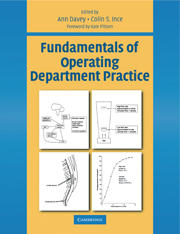Book contents
- Frontmatter
- Contents
- Contributors
- Preface
- Foreword
- Acknowledgements
- Introduction
- Chapter 1 The operating department practitioner, the patient and the law
- Chapter 2 Aspects of health and safety in the operating department
- Chapter 3 The caring practitioner
- Chapter 4 Strategies for infection control in the operating department
- Chapter 5 Sterilization, decontamination and the surgical field
- Chapter 6 The fundamentals of cardiovascular physiology
- Chapter 7 Fundamentals of respiratory physiology
- Chapter 8 Scientific principles in relation to the anaesthetic machine
- Chapter 9 Fundamentals of artificial ventilation of the lung
- Chapter 10 Scientific principles in relation to monitoring equipment
- Chapter 11 Scientific principles in relation to endoscopic, laser and radiological equipment
- Chapter 12 Pharmacological principles of drug administration
- Chapter 13 The pharmacology of drugs used in general anaesthesia
- Chapter 14 The local anaesthetic drugs - does the ideal agent exist?
- Chapter 15 The safe positioning of patients for surgery
- Chapter 16 Principles involved in the management and use of equipment
- Chapter 17 Understanding suture materials
- Chapter 18 Fundamentals ofpaediatric surgery and anaesthesia
- Chapter 19 Fundamentals of hyperthermia and hypothermia
- Chapter 20 Fundamentals of fluid and electrolyte balance during surgery
- Chapter 21 The physiology of blood and its administration
- Chapter 22 Fundamentals of pain relief
- Chapter 23 Fundamentals of dressings and drains in relation to wound healing
- Chapter 24 The recovery of patients from anaesthesia and surgery
- Chapter 25 Fundamentals of emergency and obstetric anaesthesia
- Chapter 26 Identification and management of anaesthetic emergencies
- Chapter 27 The fundamentals of emergency resuscitation
- Appendixes
- Index
Chapter 3 - The caring practitioner
Published online by Cambridge University Press: 05 October 2015
- Frontmatter
- Contents
- Contributors
- Preface
- Foreword
- Acknowledgements
- Introduction
- Chapter 1 The operating department practitioner, the patient and the law
- Chapter 2 Aspects of health and safety in the operating department
- Chapter 3 The caring practitioner
- Chapter 4 Strategies for infection control in the operating department
- Chapter 5 Sterilization, decontamination and the surgical field
- Chapter 6 The fundamentals of cardiovascular physiology
- Chapter 7 Fundamentals of respiratory physiology
- Chapter 8 Scientific principles in relation to the anaesthetic machine
- Chapter 9 Fundamentals of artificial ventilation of the lung
- Chapter 10 Scientific principles in relation to monitoring equipment
- Chapter 11 Scientific principles in relation to endoscopic, laser and radiological equipment
- Chapter 12 Pharmacological principles of drug administration
- Chapter 13 The pharmacology of drugs used in general anaesthesia
- Chapter 14 The local anaesthetic drugs - does the ideal agent exist?
- Chapter 15 The safe positioning of patients for surgery
- Chapter 16 Principles involved in the management and use of equipment
- Chapter 17 Understanding suture materials
- Chapter 18 Fundamentals ofpaediatric surgery and anaesthesia
- Chapter 19 Fundamentals of hyperthermia and hypothermia
- Chapter 20 Fundamentals of fluid and electrolyte balance during surgery
- Chapter 21 The physiology of blood and its administration
- Chapter 22 Fundamentals of pain relief
- Chapter 23 Fundamentals of dressings and drains in relation to wound healing
- Chapter 24 The recovery of patients from anaesthesia and surgery
- Chapter 25 Fundamentals of emergency and obstetric anaesthesia
- Chapter 26 Identification and management of anaesthetic emergencies
- Chapter 27 The fundamentals of emergency resuscitation
- Appendixes
- Index
Summary
THE COMPLEXITIES OF CARE
Care may be defined as “providing for physical needs, help or comfort” (Collins English Dictionary) and carers may also be thought of as part of the framework of our human experience. Examples of both abound in our daily lives.
Care is partly instinctive but can be enhanced and developed by experience, education and effort. It is not and never has been the prerogative of one section of society, professional group or role holder and there are as many varieties of care and carers as there are people and situations.
Nevertheless, the research and theory underpinning modern concepts of care and their subsequent development into frameworks for practice have all originated from the nursing profession. Although much of the phraseology therefore inevitably refers to “nurses” or “nursing”, this does not preclude the translation of the ideals, beliefs and values at its core to the practitioner's sphere of practice.
Care itself has many facets worth exploring but it should always be continuous, individualized, patient centred, needs-based and collaborative.
Perioperative care includes pre-, intra- and postoperative phases and involves every member of the multidisciplinary team (ideally this includes the patient) and must be planned, demonstrable and communicable.
In order to deliver care in a holistic way, carers need to be able to view those for whom they care as unique and complex beings whose goals and outcomes are ultimately determined by their individual needs and problems. It is also essential for carers to perceive, relate to and take account of the psychological and social aspects of problems as well as their more evident physical manifestations.
These requirements assume an ever-increasing importance in the current climate which affects our Health Service. Each Trust has a responsibility:
• To deliver an acceptable, affordable level of service;
• For strategies of Risk Management;
• For Clinical Audit.
All these are influenced by the impact of market forces, the Patient's Charter and the rising awareness and expectations of service users and purchasers. The political emphasis may change but the basic concepts will always be present.
- Type
- Chapter
- Information
- Fundamentals of Operating Department Practice , pp. 27 - 34Publisher: Cambridge University PressPrint publication year: 1999
- 1
- Cited by



